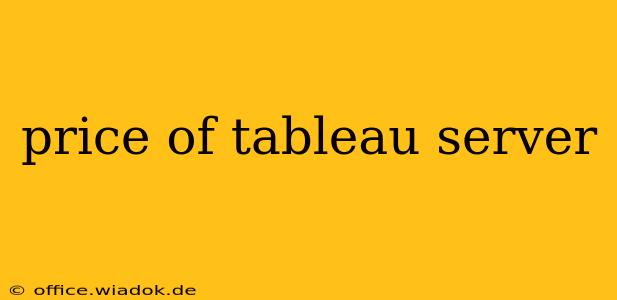Tableau Server, a powerful data visualization and analytics platform, offers robust capabilities for organizations of all sizes. However, understanding its pricing can be complex. This comprehensive guide breaks down the cost factors, providing clarity for potential buyers and helping you determine if Tableau Server is the right investment for your needs.
Key Factors Influencing Tableau Server Price
The cost of Tableau Server isn't a fixed number. It's highly dependent on several crucial factors:
1. Number of Users:
This is the most significant price determinant. Tableau Server licenses are typically purchased based on the number of named users who will access and utilize the platform. More users mean a higher upfront cost.
2. License Type:
Tableau offers different license types, each with varying features and price points:
- Creator: Allows users to create and publish dashboards and workbooks.
- Explorer: Enables users to interact with existing dashboards and workbooks. Generally less expensive than Creator licenses.
- Viewer: Offers limited access, primarily for viewing dashboards. This is typically the most cost-effective option.
The optimal license type mix depends on your organization's specific needs and user roles. A careful assessment of user requirements is crucial to minimize costs while ensuring functionality.
3. Deployment Option:
You can deploy Tableau Server on-premises (within your own infrastructure) or utilize Tableau Online, a cloud-based solution. On-premises deployments usually involve higher initial infrastructure costs but offer more control and customization. Tableau Online simplifies deployment and maintenance, with pricing based on user subscriptions.
4. Add-ons and Support:
Additional features and support services can increase the overall cost. These might include:
- Tableau Prep Builder: For data preparation and cleaning.
- Specialized connectors: For integrating with specific data sources.
- Professional services: For implementation, training, and ongoing support.
- Maintenance and support contracts: To ensure access to updates, bug fixes, and technical assistance.
Estimating the Cost: Beyond the License Fee
While the license cost is substantial, it's only part of the overall investment. Consider these hidden costs:
- Hardware and Infrastructure (On-premises only): Servers, storage, network equipment, and IT personnel for setup, maintenance, and administration.
- Training and Implementation: Costs associated with training users, integrating Tableau Server into your existing systems, and developing customized dashboards and reports.
- Data Management and Governance: The cost of managing your data sources, ensuring data quality, and establishing governance procedures to comply with regulations.
- Ongoing Maintenance: Regular software updates, security patches, and potentially consulting services for troubleshooting and optimization.
Finding the Right Price for Your Needs
To determine the precise price of Tableau Server for your organization, the best approach is to:
- Assess your user base and their needs: Determine how many users require access and the appropriate license type for each.
- Evaluate your deployment strategy: Choose between on-premises or cloud deployment based on your IT infrastructure, budget, and technical expertise.
- Identify required add-ons and support services: Determine which features and services are essential for your operations.
- Contact a Tableau sales representative: They can provide a personalized quote based on your specific requirements.
Ultimately, the price of Tableau Server reflects its value in enabling data-driven decision-making. By carefully considering the factors discussed above, you can make an informed decision that aligns with your budget and organizational objectives. Remember that a well-planned implementation, optimized user training, and ongoing maintenance are critical for maximizing the return on your investment.

